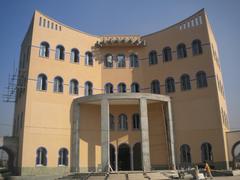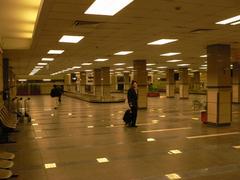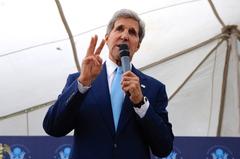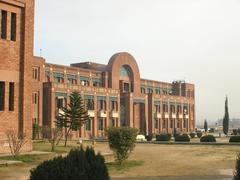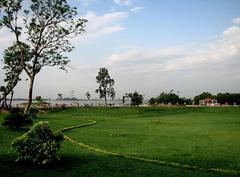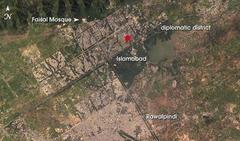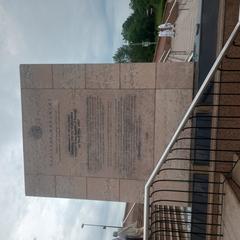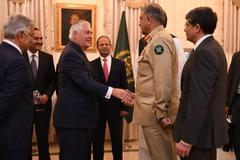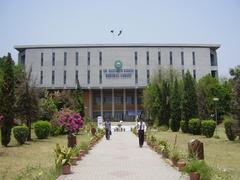Lok Virsa Museum Islamabad: Visiting Hours, Tickets, and Attractions Guide
Date: 14/06/2025
Introduction
Nestled in the scenic Shakarparian Hills of Islamabad, the Lok Virsa Museum—officially known as the Pakistan National Museum of Ethnology—stands as the nation’s foremost institution for the preservation and celebration of folk and traditional heritage. Operated by the National Institute of Folk and Traditional Heritage, since its establishment in 1974, the museum has grown into Pakistan’s largest ethnological museum, offering an immersive journey through the country’s vibrant cultural tapestry. Lok Virsa serves as a dynamic hub for locals and international visitors alike, featuring life-size dioramas, interactive galleries, artisan workshops, and lively festivals that highlight Pakistan’s ethnic and regional diversity (Lok Virsa official history; Wikipedia; The Karachi Collective; Graana.com).
This comprehensive guide provides essential information on Lok Virsa Museum visiting hours, ticket prices, key exhibits, accessibility, special events, and practical tips to help you make the most of your visit to this cultural treasure in Islamabad.
Table of Contents
- Historical Background and Cultural Significance
- Museum Layout and Key Exhibits
- Visiting Information
- Facilities and Amenities
- Visitor Experience and Tips
- Special Activities and Events
- Nearby Attractions and Accommodation
- Safety and Visitor Conduct
- Frequently Asked Questions (FAQs)
- Visuals, Media, and Contact Information
- Conclusion and Key Visitor Tips
- References and External Links
Historical Background and Cultural Significance
Origins and Establishment
Lok Virsa Museum was inaugurated in 1974 with the mission to preserve, document, and promote Pakistan’s diverse folk traditions and regional crafts (Lok Virsa official history; Wikipedia). Its location atop Shakarparian Hills was chosen for both its accessibility and its symbolic resonance with Pakistan’s natural heritage. The museum originally spanned 20,000 square feet and has since grown to nearly 60,000 square feet, reflecting its evolving role as the cultural heart of the nation (The Karachi Collective; Graana.com).
Evolution and Mandate
In 2004, the museum was renamed the Pakistan National Museum of Ethnology, broadening its focus to encompass the country’s full ethnic, linguistic, and cultural diversity. Lok Virsa operates under the National Institute of Folk and Traditional Heritage, led by a Board of Governors, and enjoys autonomy in research, documentation, and educational outreach (Zameen.com). The museum’s mandate covers tangible and intangible heritage—including crafts, folk music, oral traditions, festivals, and more. It regularly publishes educational materials and multimedia resources to promote cultural awareness (Lok Virsa official site).
Cultural and Societal Impact
Lok Virsa is celebrated as a “museum of the people,” featuring immersive galleries, dioramas, textiles, jewelry, woodwork, and architectural facades that portray daily life and festivities from across Pakistan’s provinces (TravelSetu; Zameen.com). The annual Lok Mela festival and other cultural events draw thousands of visitors, offering artisans a platform for their crafts and engaging communities in living traditions.
The museum’s Heritage Reference Library holds over 30,000 books and manuscripts, supporting research and education (Zameen.com). Lok Virsa’s innovative use of digital platforms, guided tours, and partnerships with educational institutions ensures its continued relevance for new generations (TravelPakistani; The Karachi Collective).
Museum Layout and Key Exhibits
Location and Setting
Lok Virsa Museum is centrally situated in Islamabad’s cultural district, adjacent to major city landmarks such as the Pakistan Monument and Shakarparian National Park (UrTrips; TravelSetu). Its landscaped grounds and open courtyards provide a tranquil and authentic backdrop for exploring Pakistan’s folk heritage.
Architectural Features
The museum’s architecture draws inspiration from traditional Pakistani villages, featuring rustic facades, life-size dioramas, and thematic galleries connected by spacious corridors and sunlit atriums (newdoor.pk). Ramps, elevators, and clear signage ensure accessibility for all visitors.
Main Sections and Notable Galleries
- Heritage Museum (Main Building): Showcases permanent and rotating exhibitions representing all regions of Pakistan.
- Provincial Galleries: Separate sections dedicated to Punjab, Sindh, Khyber Pakhtunkhwa, Balochistan, Gilgit-Baltistan, and Azad Kashmir, each featuring traditional crafts, textiles, and regional art.
- Hall of Antiquities: Archaeological artifacts from the Indus Valley Civilization, including pottery, jewelry, and textiles.
- Sufis and Shrines Gallery: Replicas of revered shrines, musical instruments, and Sufi manuscripts.
- Folk Music and Performing Arts Gallery: Over 200 traditional instruments, regional costumes, and interactive audio-visual displays.
- Open-Air Museum: Life-size models of rural homes and agricultural scenes.
- Crafts Bazaar and Artisan Workshops: Live demonstrations of pottery, weaving, block printing, and handicraft sales.
- Audio-Visual Archive: A research center preserving thousands of hours of folk music and oral histories.
Permanent and Special Exhibits
- Truck Art Display: A full-size, decorated Pakistani truck showcasing iconic folk art.
- Dioramas of Festivals and Weddings: Immersive displays of regional celebrations and customs.
- Children’s Discovery Area: Interactive exhibits on traditional games and storytelling.
(Dawn; Top 10 Places to Visit in Islamabad)
Visiting Information
Visiting Hours and Tickets
- Regular Hours: Typically open Tuesday to Sunday, 10:00 AM – 8:00 PM. Closed on Mondays. On Fridays, closed for prayer break from 12:30 PM to 2:00 PM (HamariWeb).
- Ticket Prices (June 2025):
- Adults: PKR 50
- Children (under 12): PKR 20
- Students (with valid ID): PKR 20
- Foreigners: PKR 200
- Purchase: Tickets are available at the museum entrance (onsite). Check the official website for updates and possible online booking.
How to Get There
Lok Virsa Museum is located on Garden Avenue, Shakarparian Road. It is easily accessible by car, taxi, ride-hailing services (Careem, Uber), or public transport. Onsite parking is available for individual and group visits. (UrTrips)
Accessibility
The museum is wheelchair-accessible, with ramps, wide corridors, and accessible restrooms throughout the complex. Assistance is available upon request (humbo.com).
Travel Tips
- Verify current hours and ticket prices before your visit.
- Allocate 2–3 hours for a thorough experience.
- Weekday mornings and off-peak seasons (spring and autumn) are less crowded.
- Photography is allowed in most areas; flash, tripods, and video may be restricted.
- Modest attire and comfortable footwear are advised.
- Security checks are in place; only carry essential belongings.
Facilities and Amenities
- Parking: Spacious lot for cars and buses.
- Restrooms: Clean and well-maintained throughout the premises.
- Food and Refreshments: Onsite snack kiosks and tea stalls; nearby cafés offer full meals.
- Souvenir Shops: Handicrafts, books, and authentic memorabilia available for purchase (TravelSetu).
Visitor Experience and Tips
- Guided Tours: Available in English and Urdu. Advance booking is recommended for groups and for tours in additional languages.
- Best Photographic Spots: Chandni Chowk hall, traditional village dioramas, courtyards with scenic views of Islamabad and Margalla Hills.
- Children and Families: The museum offers interactive exhibits and activities for all ages.
- Safety: Islamabad is generally safe; Lok Virsa maintains strict visitor protocols (World City History).
Special Activities and Events
- Cultural Festivals: The annual Lok Mela, folk music performances, and dance workshops bring Pakistan’s living heritage to life (TravelSetu).
- Art and Photography Exhibitions: Temporary exhibitions feature local artists and new perspectives on Pakistani culture.
- Documentary Screenings: Regular film showings on tradition, crafts, and folk music.
Nearby Attractions and Accommodation
- Pakistan Monument & Museum: 4.8 km away.
- Kachnar Park: 2.7 km away.
- Daman-e-Koh, Rawal Lake, Saidpur Village: Nearby for broader cultural exploration (UrTrips; TravelSetu).
- Hotels and Guesthouses: Available within 5–10 km in Blue Area, G-6, G-7, and surrounding sectors.
Safety and Visitor Conduct
- Respect all exhibits; do not touch artifacts unless permitted.
- Eating and drinking allowed only in designated areas.
- Security personnel may conduct bag checks at entry.
- Keep the museum clean and maintain decorum at all times.
Frequently Asked Questions (FAQs)
Q: What are the Lok Virsa Museum visiting hours?
A: Typically, 10:00 AM to 8:00 PM, Tuesday to Sunday. Closed Mondays and for Friday prayer (12:30 PM–2:00 PM).
Q: How much are Lok Virsa Museum tickets?
A: Adults: PKR 50; Children and students: PKR 20; Foreigners: PKR 200 (subject to change).
Q: Is the museum accessible for wheelchair users?
A: Yes, the museum is fully accessible.
Q: Are guided tours available?
A: Yes, in English and Urdu; contact for special language requests.
Q: Can I take photographs inside the museum?
A: Yes, but avoid flash and video unless permitted.
Q: Are tickets available online?
A: Currently, tickets are purchased onsite; check the official website for updates.
Q: Is Lok Virsa Museum suitable for children?
A: Yes, it offers interactive and educational exhibits for all ages.
Visuals, Media, and Contact Information
- Virtual Tour: Explore Lok Virsa Museum online
- Photo Galleries: Available on the museum’s official website and travel platforms.
- Address: Garden Avenue, Shakarparian Road, Islamabad, Pakistan
- Official Contact: HamariWeb Museum Info
Conclusion and Key Visitor Tips
Lok Virsa Museum is an essential destination for anyone seeking to understand Pakistan’s rich folk heritage and living traditions. Plan your visit by checking the latest Lok Virsa Museum visiting hours and ticket details, and consider joining a guided tour for deeper insights. The museum’s central location makes it a perfect starting point for exploring other Islamabad historical sites.
For current updates on special events, workshops, and visitor amenities, consult the official Lok Virsa Museum website and follow their social media channels. Download the Audiala app for seamless navigation and discover related posts to enhance your Islamabad travel experience.
References and External Links for Further Information
- Lok Virsa official history, 2025, Pakistan National Institute of Folk and Traditional Heritage (Lok Virsa official history)
- Wikipedia, Lok Virsa Museum, 2025 (Wikipedia)
- The Karachi Collective, The Lok Virsa: A Cultural Educational Repository, 2024 (The Karachi Collective)
- Graana.com, An Overview of Lok Virsa Heritage Museum Islamabad, 2024 (Graana.com)
- Zameen.com, Lok Virsa Museum Islamabad: Visiting Hours, Tickets & Cultural Significance, 2024 (Zameen.com)
- TravelSetu, Lok Virsa Museum Tourism History, 2024 (TravelSetu)
- TravelPakistani, Lok Virsa Museum - A Journey Through Pakistan’s Cultural Heritage, 2024 (TravelPakistani)
- Dawn News, Lok Virsa Museum Overview, 2024 (Dawn)
- UrTrips, Lok Virsa Heritage Museum Islamabad, 2025 (UrTrips)
- HamariWeb, Lok Virsa Museum Ticket Price and Timings, 2025 (HamariWeb)
- NewDoor.pk, Discover the Historic Lok Virsa Museum, 2024 (NewDoor.pk)
- TheTouristChecklist, Things to Do in Islamabad, 2024 (TheTouristChecklist)
- TodayIslamabad.com, Top 10 Places to Visit in Islamabad, 2024 (TodayIslamabad.com)
- World City History, Islamabad Overview, 2025 (World City History)
